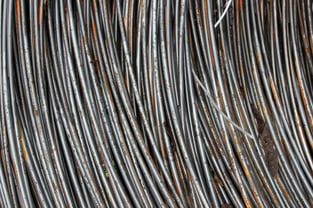Steel is an incredibly useful material for manufacturing. The discovery of steel jumped manufacturing and technology forward, allowing us to build bigger and better structures and products. However, as versatile and useful as plain steel is, it is not always the right material for the job, particularly when you’re making ultra-high-end products using extreme finishing and washing processes.
Plain steel baskets can pose a problem in your production process for several reasons. What are some of these issues, and why should you use a different material instead? Here are a few of the reasons why you might want to avoid using plain steel in your product finishing process:
#1 Corrosion Resistance
 With the right materials, your custom basket design should last for years, perhaps even decades of use. With ordinary, cheap plain steel, however, you might be lucky to get a few dozen uses out of the basket, depending on your particular process.
With the right materials, your custom basket design should last for years, perhaps even decades of use. With ordinary, cheap plain steel, however, you might be lucky to get a few dozen uses out of the basket, depending on your particular process.
For example, in any process that involves submerging the basket in any kind of aqueous solution, Marlin Steel’s degreed engineers typically recommend a material that is chemical and corrosion resistant, such as grade 304 stainless steel. Stainless steels are generally resistant to the effects of exposure to moisture, and will not corrode after brief submersion in mild chemicals.
#2 High Temperature Heat Treat Processes
Plain Steel possesses a high melting point, able to take temperatures up to 1,370° C (2,500° F) before liquefying. Therefore, shouldn’t a plain steel basket be suitable for heat treat processes which burn up to 871° C (1,600° F)?
The answer is no.
Even though plain steel won’t liquefy until it reaches its melting temperature, it does lose much of its tensile strength well before reaching its melting temperature. This can pose a problem when heat-treating heavy parts, as a plain steel basket that could once hold 30 lbs. of weight without issue loses more than half of its strength before hitting the heat treat process’ maximum temperature.
As the steel loses strength, it will sag and deform under the weight of held parts, potentially becoming so deformed that it gets stuck in the machinery, causing damage and time lost clearing the jam. Even if the plain steel didn’t deform, it would likely suffer heavily from scaling.
This is why materials specialized for temperature resistance such as Inconel or grade 330 stainless steel. These materials are able to withstand extremely high temperatures without losing tensile strength, and are resistant to scaling.
#3: Frequency of Replacement
What good does it do to save money on the basket order if the baskets have to be replaced more than 5 times as often?
When plain steel is not resistant to the forces involved in your production process, any basket made from it will inevitably fail and be rendered useless. By using a basket made from the right materials, you can limit the amount of repeated orders you have to place, which saves you time and money in the long run.
#4: Scratching of Delicate Parts in Some Processes
 Many manufacturers have to be very conscientious of the surface condition of their final product.
Many manufacturers have to be very conscientious of the surface condition of their final product.
For example, in the aerospace industry, the tiniest flaw in the surface of a panel could become a stress point that allows air friction to cause more damage.
When putting ultra-delicate, no-scratch parts through an ultrasonic cleaning process, minimizing metal to metal contact is a must. However, with plain steel, your part is being put against a hard surface during the cavitation process, with several thousand small, but rough, impacts per second. Even worse, plain steel is likely to corrode and develop rust which can rub off on parts.
To avoid this, many manufacturers use a coating of softer material such as PVC to protect both the basket and the parts being washed from the impacts caused by ultrasonic vibrations. The softer material is less likely to damage a part, and will also keep the metal of the basket protected from exposure to the aqueous solution used in ultrasonic cleaning.
#5: Inability to Provide Start to Finish Processing
With a stock, plain steel basket, many manufacturers simply cannot use the one basket for all of the processes involved in finishing a part and getting it ready for shipment.
Plain steel’s inability to take extreme conditions means switching to a basket made of more durable materials throughout the finishing process. Loading and unloading a basket takes time, and slows down production.
Using a more durable material that is useful for a variety of processes, on the other hand, helps to keep production running smoothly by limiting the time spent on moving parts from one basket to another.
Find out how to choose the right basket for the job by checking out our free guide at the link below:



.gif)


